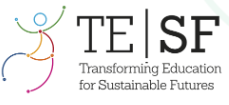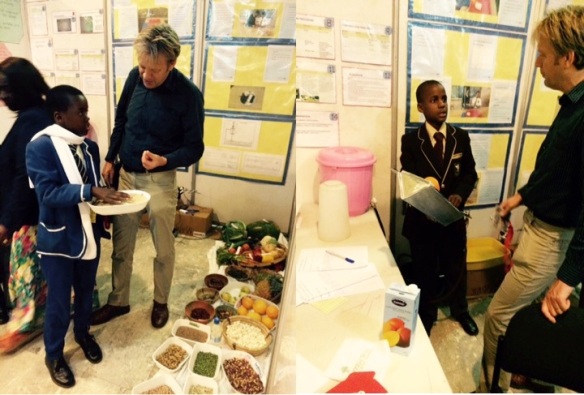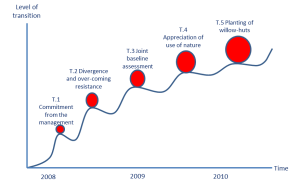Recently I contributed to the 5th Living Knowledge Conference which was held in Bonn, Germany with a talk on “Science as community: Sustainability- oriented trans-disciplinary research” and by providing input to a drafting process that resulted in a communique on higher education’s role in moving towards a more sustainable world. This communique is to be presented and discussed at the Sustainability Summit in Rio which will be held in June (also known as Rio +20).
The “Big Tent” Group – also known as the Higher Education Treaty Circle – is a collaboration of regional and global networks of civil society and higher education networks with a total membership of over 5,000 universities and civil society research organizations. The group was created to make a joint contribution to the RIO + 20 United Nations Sustainability Summit and the parallel Global Civil Society conference on Sustainability taking place in June in Rio de Janeiro.
Via an on-line contribution platform I was able to include a few lines myself including one that states that “Universities have a responsibility to look after the well-being of the planet, not as stand-alone beacons of knowledge, but as places where wisdom of communities, eco-systems and the academy work together in partnerships for a world that is more sustainable and just”.
The focus of the communique is on how civil society and universities can co-create radically new knowledge together.
Canada’s Budd Hall from the University of Victoria says, “This is the first statement agreed upon by so many higher education networks calling for a deep examination of the need to re-examine whose knowledge counts and how we can co-construct new disciplines for a new world”
I am pasting in the current communique for you to read, comment on and, if you like, to share with others who might be intrrested and/or might need to know.
RioCommuniqueOnSustHEI-Final-May 20
Communiqué on Sustainability, Knowledge and Democracy* (Released on May 12 in Bonn, Germany at the 5th International Conference of the Living Knowledge Network)
This statement is the product of a global dialogue and discussion process hosted by the Living Knowledge Network.
It is an initiative of the ‘Big Tent’ Group of international networks which includes: Asia Pacific University Community Engagement Network, Centro Boliviano de Estudios Multidisciplinarios, Commonwealth Universities Extension and Engagement Network, Community Campus Partnerships for Health, Global Alliance on Community Engaged Research, Global University Network for Innovation, Living Knowledge Network, PASCAL International Observatory, Participatory Research in Asia, and the Talloires Network with additional contributions participants at the 5th International Conference of the Living Knowledge Network.
We begin by expressing our deep concerns about:
The continued destruction of our common home, our planet Earth, Our over dependence on technological solutions that may result in misleading claims about positive impact on the environment, Ways that the dominant global economic system with its unitary focus on economic growth results in increased inequality, loss of jobs, alienation from both land and each other, The persistent exclusion of the dreams, potential and contributions of the socio–‐economic bottom billion people of our world, and Stressful and unhealthy lifestyles leading to physical and mental health problems;
We are witnesses to massive expressions of aspiration and deep change as seen in the Arab Spring and the Occupy movements.
We are aware and supportive of work being done to engage with civil society and its organisations in the co–‐construction of new knowledge in many spaces such as the Science in Society Programme of the European Commission, UNESCO and the Global University Network for Innovation.
We are also aware that while certain developments in science and technology have been complicit in the creation of planetary problems, evidence shows that communities and research institutions working together play a significant role in the attainment of sustainable development.
We respectfully contribute our ideas to spaces for engagement and action on issues of planetary survival, including, but not limited to the United Nations Rio + 20 events Higher Education Treaty Circle process and the Horizon 2020 programme in Europe
We call for action to:
1. Challenge existing paradigms, structures and practices, by: a) Recognizing that knowledge and expertise exists outside of the institutions of higher education. Communities and the earth itself are intellectual spaces where knowledge is created. Decolonizing our minds and our institutions is one significant step to acting on this awareness, b) Acknowledging that ‘community’ or ‘civic’ engagement, has to mean more than just people. Community includes the environment and all the rest of nature, c) Promoting the concept of an ‘Ecoversity’ whereby higher education institutions themselves are transformed into integrated holistic communities and where research, teaching and action functions are no longer separate, d) Breaking down the silos of knowledge creation and moving to co–‐creation of knowledge between the university and community–‐new approaches for a new world, e) Being open to ideas such as appointing community scholars, and creating smaller universities, and f) Increasing policy and funding for collaborative research between civil society and higher education institutions.
2. Increase the accountability of higher education by: a) Shifting accountability from authorities and funders to citizens, involving community at all levels of Higher Education governance, b) Linking our academic work with environmental social movements and to related movements against poverty, towards a solidarity economy, c) Ensuring that people have an understanding of the interdependencies between environmental, social and economic forces and the skills and abilities to meet sustainability challenges, and d) Moving beyond eco–‐branding by holding institutions accountable for the trademarks, brands and media around sustainability that they display.
3. Understand the connections of our local practices within a global framework by: a) Acknowledging that in this inter–‐connected world, ecological disturbances in one eco–‐zone can spread rapidly throughout the world, b) Promoting new mechanisms of global governance and democratic accountability with multi–‐stakeholder perspectives, and c) Supporting the development of higher education theories and practices that nurture a global public good.
In closing
We live in turbulent times; our world is changing at accelerating speed. Information is everywhere, but wisdom appears in short supply when trying to address key inter–‐related challenges of our time such as; runaway climate change, the loss of biodiversity, the depletion of natural resources, the on–‐ going homogenization of culture, and rising inequity. Universities have a responsibility to look after the well–‐being of the planet, not as stand–‐alone beacons of knowledge, but as places where wisdom of communities, eco–‐ systems and the academy work together in partnerships for a world that is more sustainable and just.





 Jane Jacobs and Elinor Ostrom were both giants in their impact on how we think about communities, cities, and common resources such as space and nature. But we don’t often put them together to recognize the common threads in their ideas.
Jane Jacobs and Elinor Ostrom were both giants in their impact on how we think about communities, cities, and common resources such as space and nature. But we don’t often put them together to recognize the common threads in their ideas.






